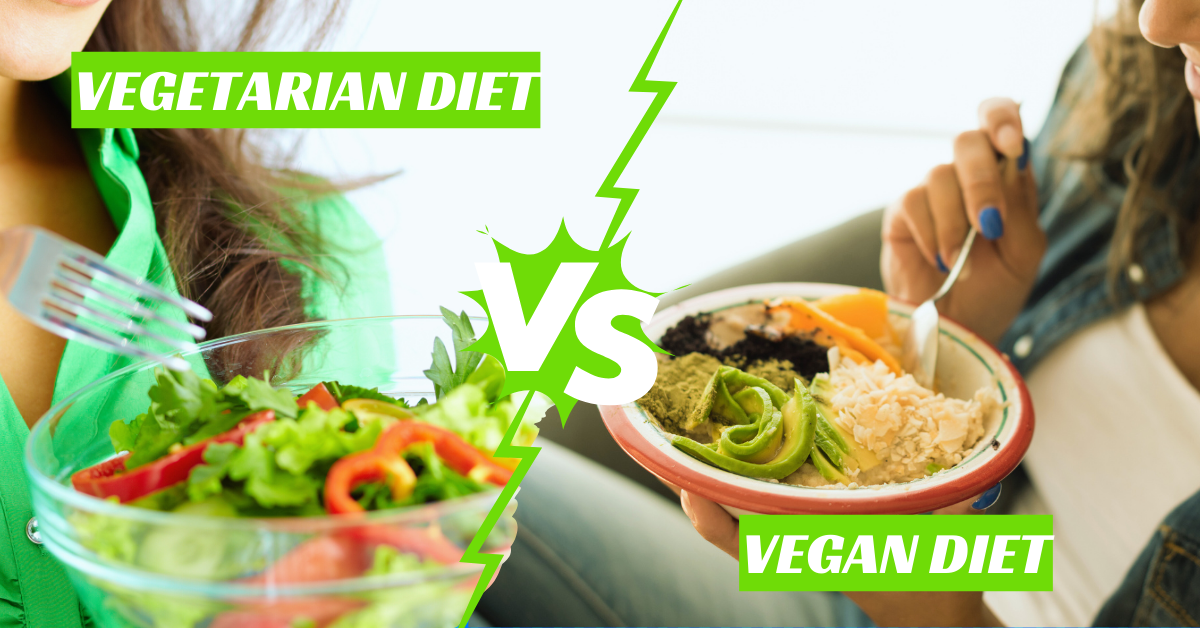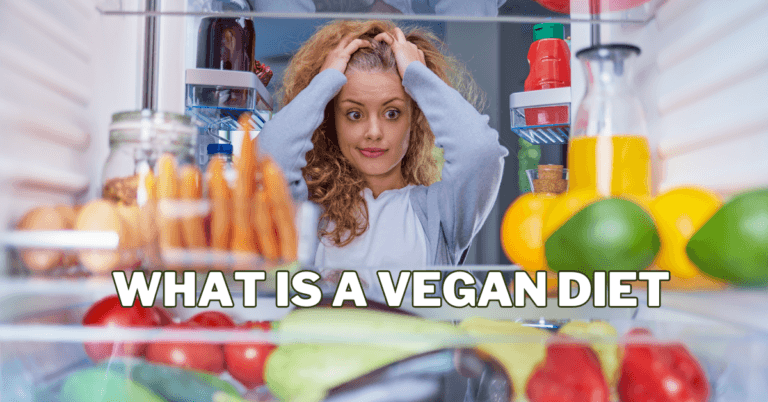Vegetarian vs Vegan Diets: What’s The Real Difference?
Understanding the differences between vegetarian vs vegan diets is essential when exploring plant-based lifestyles, as each approach carries unique ethical, environmental, and health considerations. While both diets exclude animal flesh, vegan diets go a step further by avoiding all animal-derived products.
In this article, we’ll explore vegetarian vs vegan diets by comparing their benefits, challenges, and real-world impact on health, ethics, and the environment—helping you choose the option that best fits your values and lifestyle.
What Is A Vegetarian Diet?
A vegetarian diet primarily focuses on plant-based foods, excluding meat, fish, and poultry. However, depending on the type of vegetarianism, it may include animal-derived products like dairy, eggs, and honey.
The most common types are lacto-ovo vegetarians, who consume dairy and eggs; lacto-vegetarians, who include dairy but not eggs; and ovo-vegetarians, who consume eggs but not dairy.
This diet provides a range of nutrients like fiber, vitamins, and antioxidants, emphasizing fruits, vegetables, legumes, grains, nuts, and seeds.
However, careful planning is required to avoid deficiencies in nutrients like protein, iron, vitamin B12, and omega-3 fatty acids, often obtained from animal sources.
Fortified meals or supplements could be required to address these nutritional needs. Beyond health, many people adopt vegetarianism for ethical reasons, environmental concerns, or cultural traditions.
This diet offers flexibility, making it an accessible and sustainable choice for many individuals. Whether motivated by personal values or health goals, the vegetarian diet encourages mindful eating and a closer connection to nature’s bounty.
What Is A Vegan Diet?
A vegan diet excludes all foods from animals, including meat, fish, poultry, dairy, eggs, and honey. Instead, it centers on plant-based foods such as fruits, vegetables, grains, legumes, nuts, and seeds.
Beyond eating, this rigorous dedication to avoiding animal products extends to lifestyle choices, often banning products such as leather, wool, and cosmetics that have undergone animal testing.
Nutritionally, a well-balanced vegan diet is rich in fiber, vitamins, minerals, and antioxidants, supporting heart health, improved digestion, and a lower risk of chronic illnesses such as diabetes and certain cancers.
However, vegans must pay special attention to nutrients such as protein, vitamin B12, iron, calcium, and omega-3 fatty acids, which are commonly found in animal products. These can be obtained through fortified foods, plant-based alternatives, and supplements when necessary.
Ethically, many people choose veganism to minimize animal exploitation and environmental damage, as it supports sustainable farming and reduces greenhouse gas emissions.
While transitioning to a vegan diet can be challenging due to social norms and limited food options in some areas, the growing availability of vegan products makes it increasingly accessible.
Critical Differences Between Vegetarian And Vegan Diets
Understanding the critical distinctions between vegetarian vs vegan diets can help individuals choose the approach that best aligns with their values, health goals, and lifestyle preferences.
1. Definition And Scope
Vegetarian Diet
This diet excludes meat, poultry, and fish but typically includes animal-derived products such as dairy, eggs, and honey. Variations exist:
- Lacto-ovo vegetarians consume both dairy and eggs.
- Lacto vegetarians consume dairy but not eggs.
- Ovo vegetarians include eggs but not dairy.
Vegan Diet
The vegan diet avoids all animal-derived products, including meat, dairy, eggs, honey, and animal-based additives like gelatin.
Veganism often extends beyond food to exclude items like leather, wool, and animal-tested products, reflecting a broader ethical stance.

2. Nutritional Differences
Vegetarian Diet
This diet offers flexibility in nutrient sources, including dairy and eggs. These foods provide protein, calcium, vitamin B12, and omega-3 fatty acids, reducing the risk of deficiencies with minimal supplementation.
Vegan Diet
Requires careful planning to ensure adequate intake of essential nutrients like vitamin B12, iron, protein, and omega-3s. Fortified foods, plant-based alternatives, and supplements are often necessary to meet nutritional needs.
3. Ethical And Environmental Motivations
Vegetarian Diet
The differences between vegetarian and vegan diets lie in their commitment to animal rights and environmental concerns. Vegans adopt a stricter approach by avoiding all animal-derived products.
Vegan Diet
Vegans adopt a stricter ethical stance, rejecting all forms of animal exploitation, including dairy farming and beekeeping.
Veganism also comprehensively addresses environmental concerns by minimizing resource use and reducing greenhouse gas emissions.
4. Social And Practical Considerations
Vegetarian Diet
Easier to adopt in most cultures due to the widespread availability of vegetarian-friendly dishes and ingredients. Dining out and meal preparation are generally more convenient.
Vegan Diets
It can be more challenging socially and logistically, especially in settings where plant-based options are limited. However, the rise of vegan-friendly products and restaurants makes them increasingly accessible.
5. Flexibility And Commitment
Vegetarian Diet
This diet allows for greater flexibility, making it an appealing starting point for those transitioning to plant-based eating.
Vegan Diet
Demands a higher level of commitment to adhere to strict dietary and ethical guidelines.

Health Benefits Of Vegetarian Diets
1. Promotes Heart Health
A vegetarian diet often lowers cholesterol and saturated fats, which reduces the risk of heart disease. Plant-based foods like vegetables, whole grains, and nuts are rich in heart-healthy fiber and antioxidants.
2. Aids In Weight Management
Vegetarian diets often emphasize nutrient-dense foods, which are lower in calories but high in essential nutrients. This helps control weight by improving satiety without overeating.
3. Reduces Risk Of Type 2 Diabetes
Consuming more fruits, vegetables, and whole grains helps regulate blood sugar levels. The fiber in plant-based foods slows digestion, preventing sharp spikes in blood sugar and reducing the risk of diabetes.
4. Improves Digestion
Vegetarian diets are naturally high in fiber, which promotes a healthy gut. Fiber aids in regular bowel movements, reduces constipation and supports beneficial gut bacteria.
5. Lowers Cancer Risk
Plant-based diets are rich in antioxidants and phytochemicals, which combat oxidative stress and inflammation. These properties may lower the risk of developing certain cancers, especially colorectal and breast.
6. Enhances Kidney Function
Cutting back on meat can help reduce renal strain. Plant proteins, which are kinder to the kidneys, can also benefit people who have or are at risk of developing chronic renal disease.
7. Supports Healthy Skin
Vitamins C and E, among other nutrients found in fruits and vegetables, enhance skin health by lowering oxidative damage and encouraging the creation of collagen. As a result, skin becomes more noticeable and glowing.
8. Boosts Immunity
When comparing vegetarian vs vegan diets, both provide abundant vitamins and antioxidants that strengthen the immune system. However, vegans may have more plant-based foods to support immunity.
9. Alleviates Inflammation
Vegetarian diets are rich in anti-inflammatory compounds in fruits, vegetables, nuts, and seeds. Lowering inflammation reduces the risk of chronic illnesses like arthritis and cardiovascular disease.
10. Improves Longevity
A diet rich in plant-based foods has been linked to longer lifespans. The reduced risk of chronic diseases and overall better health increase longevity.
11. Protects The Environment
While not a direct health benefit, adopting a vegetarian diet supports sustainability. By reducing environmental stress, it ensures a healthier planet, which indirectly improves human well-being.
12. Boosts Energy Levels
When well-planned, vegetarian diets provide steady energy from complex carbohydrates, healthy fats, and iron-rich plant foods. This combats fatigue and keeps energy levels stable.

Health Benefits Of Vegan Diets
1. Promotes Heart Health
Vegan diets are free of cholesterol and low in saturated fats. The emphasis on whole grains, legumes, nuts, and seeds lowers blood pressure, reduces bad cholesterol (LDL), and supports cardiovascular health.
2. Aids in Weight Management
Vegan diets typically focus on high-fibre, nutrient-dense foods that promote satiety and reduce calorie intake. This helps maintain a healthy weight or achieve weight loss goals.
3. Reduces Risk of Type 2 Diabetes
High-fibre vegan diets stabilize blood sugar levels by slowing digestion. Consuming whole grains, fruits, and vegetables helps reduce insulin resistance and the risk of diabetes.
4. Improves Digestion
The abundance of fiber in vegan diets promotes gut health by supporting regular bowel movements and fostering a healthy microbiome, reducing issues like constipation and bloating.
5. Lowers Cancer Risk
Colon, breast, and prostate cancer risk is reduced by vegan diets, which are high in antioxidants and phytochemicals that fight inflammation and oxidative stress.
6. Supports Kidney Health
Replacing animal proteins with plant proteins reduces kidney strain. This diet is especially beneficial for those managing chronic kidney disease or aiming to prevent kidney-related issues.
7. Enhances Skin Health
A vegan diet is high in vitamins A, C, and E in fruits and vegetables. These vitamins promote collagen production, combat acne, and provide a radiant complexion.
8. Boosts Immunity
When considering vegetarian vs vegan diets, vegan diets offer a more comprehensive range of plant-based nutrients and antioxidants that help boost immunity and fight infections. Antioxidants in foods like berries, leafy greens, and citrus fruits enhance the body’s ability to fight infections.
9. Reduces Inflammation
Plant-based diets are naturally anti-inflammatory thanks to their focus on whole foods rich in omega-3 fatty acids, antioxidants, and fiber. This reduces the risk of chronic diseases such as arthritis and heart disease.
10. Enhances Longevity
Vegan diets reduce the risk of chronic illnesses, contributing to a longer, healthier life. The nutrient-rich, plant-based focus supports overall vitality and longevity.
11. Improves Bone Health
Calcium-rich plant foods, such as fortified plant milk, tofu, leafy greens, and vitamin D and magnesium, promote strong bones and reduce the risk of osteoporosis.
12. Promotes Hormonal Balance
Vegan diets eliminate hormones found in animal products, promoting hormonal balance. Plant-based sources like flaxseeds and soy help regulate estrogen levels naturally.

Common Myths About Vegetarian And Vegan Diets
Do you think plant-based diets lack variety or nutrients? Debunk everyday vegetarian and vegan lifestyle myths, from protein sources to affordability, and discover the truth behind these misconceptions!
1. Lack of Protein
A common myth is that plant-based diets lack sufficient protein. Food like beans, lentils, tofu, tempeh, nuts, seeds, and whole grains provides ample protein to meet dietary needs.
2. Limited Food Choices
Vegetarian and vegan diets offer a variety of vegetables, grains, and legumes, showing they are more relaxed than often assumed. These diets include a variety of fruits, vegetables, grains, legumes, and innovative plant-based products, ensuring diverse and delicious meals.
3. Deficiency In Essential Nutrients
It’s assumed that vegetarians and vegans can’t get enough iron, calcium, or vitamin B12. While planning is required, fortified foods, plant-based alternatives, and supplements can easily cover these nutritional needs.
4. Vegan Diets Are Expensive
Despite what many people think, vegan diets can be reasonably priced. Meat and dairy products are frequently more expensive than grains, beans, oats, and seasonal fruit.
5. Not Only For Weight Loss
While many people lose weight on vegetarian or vegan diets, these lifestyles are not solely for weight management. They can also focus on ethical, environmental, or health-conscious choices.
Want to Share Your Passion for Vegan Living?
Discover how easy and fulfilling vegan living can be —
from recipes and travel to lifestyle and sustainability tips.
Read this blog post next:
How to Start a Vegan Blog (and Turn Your Passion into Purpose).
Environmental Impact: Vegetarian vs Vegan Diets
When comparing vegetarian and vegan diets, both are more sustainable than omnivorous diets but differ in their environmental impacts. Here's a comparison of how these two plant-based diets affect the environment:
1. Carbon Footprint
The greenhouse gases released during farming, shipping, and processing are the main factors influencing the carbon footprint of food production.
The resources needed to grow animals, such as feed, water, and energy, result in a disproportionate amount of carbon emissions from animal-based goods, especially red meat.
Vegan Diet
A vegan diet usually has a smaller carbon footprint because it excludes all animal products. Plant-based foods like grains, fruits, and vegetables require less energy to produce and contribute fewer emissions. For example, plant-based foods like beans and lentils emit up to 50% fewer greenhouse gases than animal-based foods.
Vegetarian Diet
While a vegetarian diet excludes meat, it still includes dairy and eggs, which have a higher environmental impact than plants.
Dairy farming, in particular, produces significant methane emissions, a potent greenhouse gas. However, vegetarian diets still substantially reduce carbon emissions compared to meat-based diets.
2. Land Use
When comparing vegetarian vs vegan diets, veganism generally requires less land for food production, reducing deforestation and habitat destruction. This often leads to deforestation, habitat destruction, and biodiversity loss.
Vegan Diet
Vegan diets have significantly lower land use because they entirely avoid animal agriculture. Growing crops directly for human consumption is far more efficient than raising animals for food, requiring less land to produce the same amount of calories and protein.
Vegetarian Diet
Vegetarian diets reduce the need for land dedicated to meat production, including dairy and eggs, but they still require considerable land.
Dairy farms, for example, require large fields to grow cow feed. While less land is needed for livestock, it’s still more than for growing plant-based foods.
3. Water Usage
Water consumption is a critical factor in food sustainability. Animal agriculture is highly water-intensive due to the water required for animal hydration, feed crops, and meat processing.
Vegan Diet
A vegan diet significantly reduces water consumption. For instance, one pound of beef requires over 1,800 gallons of water to produce, whereas one pound of lentils only requires about 50 gallons. This massive difference highlights the water-saving potential of veganism.
Vegetarian Diet
While a vegetarian diet uses more water than an entirely plant-based diet, it is far more water-efficient than meat-based diets. Dairy and eggs require water, but raising livestock for meat requires more water.
FAQs
Q1: Are Vegan Diets Healthier Than Vegetarian Diets
Answer: Vegan diets can offer additional health benefits by eliminating all animal products, which may reduce the risk of heart disease, obesity, and some cancers. Still, both diets can be healthy with proper planning.
Q2: Can I Get Enough Protein On A Vegetarian Or Vegan Diet?
Answer: Both diets can provide sufficient protein through plant-based sources like beans, lentils, tofu, tempeh, and nuts.
Q3: Which Diet Is Better For The Environment?
Answer: Eliminating all animal products from vegan diets lowers carbon emissions, land use, and water use, making them less environmentally harmful than vegetarian diets.
Q4. Are Vegan Diets More Expensive Than Vegetarian Diets?
Answer: Not necessarily. Vegetarian and vegan diets can be affordable, mainly when relying on whole foods like beans, grains, and seasonal vegetables, although some processed vegan products may be pricier.
Q5: Do Vegetarian And Vegan Diets Lack Certain Nutrients?
Answer: Both diets may require attention to nutrients like vitamin B12, iron, calcium, and omega-3s, which can be obtained through fortified foods, supplements, or specific plant-based sources.
Q6: Can A Vegetarian Or Vegan Diet Be Followed In Social Settings?
Answer: Yes, but it may require more planning. Many restaurants offer vegetarian and vegan options; bringing your meals or communicating dietary needs in advance can help in social situations.
Q7: How Do I Transition From A Regular Diet To Vegetarian Or Vegan?
Answer: Start gradually by replacing animal products with plant-based alternatives. Educate yourself on nutrition and find recipes that make the transition enjoyable and sustainable.
Q8: Which Diet Is Better For Weight Loss?
Answer: Vegan and vegetarian diets emphasizing full, complete meals can help people lose weight. Still, veganism may substantially reduce calorie intake by excluding all animal products.
Conclusion
In conclusion, vegetarian and vegan diets offer health and environmental benefits, with veganism providing a greater reduction in the carbon footprint, while vegetarianism still supports sustainability.
While veganism eliminates all animal products, providing a greater reduction in the carbon footprint, vegetarianism still supports sustainability by excluding meat.
Both diets, however, have drawbacks, such as the need to ensure adequate nutrition and the influence of social factors. Through thoughtful meal planning, people can benefit from the advantages of both lifestyles while promoting their well-being and a more sustainable future.
I trust you enjoyed this article on the Vegetarian vs Vegan Diets: What’s The Real Difference? Please stay tuned for more plant-based recipes, vegan travel tips, and lifestyle inspiration.
Take care!
— JeannetteZ 🌿
💬 Your Opinion Is Important To Me
Do you have thoughts, ideas, or questions? I’d love to hear from you. Please leave your comments below, or email me directly at Jeannette@LivingTheVeganLifestyle.org.
📚 More Vegan Lifestyle Reads
🌱 My #1 Recommendation for Online Success
Sharing my passion for vegan living — from food to fashion — has been such a rewarding journey.
If you’ve ever dreamed of building your own ethical lifestyle brand or blog, this is the best place to start.
🌟 See How Vegan Bloggers Build Online Income — Try WA Free (No Credit Card Needed)
Disclosure
This post may contain affiliate links. As an Amazon Associate and participant in other affiliate programs, I earn from qualifying purchases at no extra cost to you. Please read my full affiliate disclosure.







